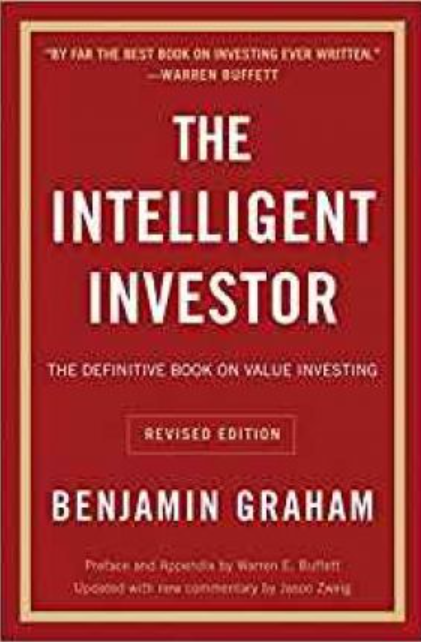Benjamin Graham, renowned for his global bestseller, the Intelligent Investor was written for the period of 1949, and yet, it is still the most respected and best investment strategy book of the current age.

Best known for being Warren Buffet’s mentor, Graham believes that anyone can be rich, regardless of high employment earnings and knowledge of the market.
The Intelligent Investor Summary
Graham, being a fresh student of Columbia University, made huge breakthroughs in the investing world at the time. Graham is still lauded as being the “father” of investing (in the same way that Newton is the “father” of gravity” as explains, with clear concise words and data, that the market was, and still is, flawed.
The irrationality of the investor and the market itself, coupled with the group-thinking movement of market prices provide opportunities for investors that are resolute in three key concepts, A strong psyche, value investing with a margin of safety, and to never changing a winning strategy. Below, we will explain each concept in detail.
Best investment advice from Intelligent Investor
Investing is 10% buying, 90% will
At the time, Graham wrote about the earnings of the market and the reactionary group investing that occurs amongst all investors.
In good time, everyone will keep buying stocks from the index, disregarding their price and assuming that the good times will keep rolling. Once a small correction occurs in the market, most panic, drop their shares and swear off investing until the next wave.
The real change occurred during the 1929 market crash, where many companies and investors went bankrupt, and some lost their minds. However, those that would have bought more shares at those rock-bottom prices could have in a few years made their money back, and then some.
Graham’s philosophy of value investing for the long term has investors conducting simple analysis, which we will go through on lesson #2, but that all starts with courage and an unwavering spirit.
Graham is famous for coining the term ‘Mr. Market” which represents the capital market as being a monopoly-man style broker. Mr. Market, at any time, has an offer for you and it is up to you to accept or deny the offer. You must always look for the intrinsic value of a company, their earnings and performance, and to stick with those valuable companies even if the moods and sentiments of Mr. Market change.
Here’s where individual investors have the power over large funds, they are quick to adopt market sentiment, whereas individual investors can win just by blocking all the noise.
Even though there were no smartphones or home laptops at the time that Graham wrote his book, he saw that the public was always exposed to various sources of news, and to try and limit yourself to as few sources as possible. He had no idea how right this statement is 70 years later.
Invest with a margin of safety
Buffet lauded his mentor, Graham, and attributed most of his rapid wealth gain in the early years of his life to this strategy. The “Value Investing” strategy is one that analyzes a company’s intrinsic value; performance, earnings, dividend payouts and current assets. In the original version of this book, Graham’s strategy was to invest in asset’s at two thirds of their net-net value, in other words, 66% of the value of their net current assets on their balance sheet.
Today, we have price-earnings ratio and the ability to scrutinize a company’s financials. The margin of safety is in essence, leaving yourself room for error and focusing on long-term gain rather than short-term gambles. Graham stipulates that in the short term, the market is a casino, and in the long term it’s a weighing machine, shaking off those that couldn’t hold on and only keeping the winners.
Investing with a margin of safety can be summarized as follows: Only buy stocks that are more valuable than their price and focus on the long term.
The irrationality of investors will always make sure that there are buying opportunities, and this coined Warren Buffet’s famous phrase “be greedy when others are fearful, and fearful when others are greedy”. Stocks with high dividend payouts, low debt-to-equity ratios, and maintaining portfolio diversity will protect you in case of company bankruptcy or large windfall.
Never Change a Winning Strategy
Mr. Market doesn’t like to keep to himself. He is fearful and spreads fear. But Mr. Market also spreads speculation, the promise of riches and enticing tales. If we can learn anything from the Intelligent Investor is that we should never listen to Mr. Market and just ourselves. When Mr. Market is screaming to jump out of a well-run company, don’t listen. When Mr. Market promises unsustainable ROI gains from new and shiny things, don’t listen. Find good companies, companies that create something and stand for something, and stick with them. Diversification, a strong psyche, focusing on the long term and allowing yourself a margin of safety for error is the best proven way to get rich. Compounding will do the work for you.
Intelligent Investor Review: The Good and the Bad
Intelligent Investor is number one in its field for a reason, it is being revised every 30 years or so with commentary to keep with new technology trends, and yet, not much of the original has changed. Investors still act the same way they did 100, 200, and even 300 years ago. fear, panic, hysteria, gambling and ego have been part of the human condition since the very beginning.
The moment we are able to 1. Acknowledge it and stay unwavering and 2. Develop a simple strategy of picking value investments, you are already ahead of most, before even deploying any money into the market.
In this review, there was a higher focus on concepts than actual numbers. This is because Graham’s analysis at the time was mostly of brick and mortar businesses. P/E ratios, Asset ratios and valuations are completely different now.
The concept of value investing still exists, but valuations are different. For specific ratios, the investor will have to do their own research, but the strategy, psychology and premise of the book will live on for as long as humankind lasts.
Should I read The Intelligent Investor?
Warren Buffet is famous for one of his simplest pieces of advice to individual investors: even large hedge funds cannot beat the market. On average, the market has returned 7-11% per year, and hedge funds cannot seem to beat this sustainably and in the long term. Buffet even challenged them with a promise of a huge payout and advertising, yet still, none could outperform the market.
This one truth, combined with the power of compounding would make anyone rich. Even if you purchased this book for that simple comment and Graham’s value approach, it would have paid for itself thousands of times over.
If you invested only 200$ a month between 35 and retirement at a market index that performs 10%, you would have 460,000. If you started at 20, it would be almost 1.3 million. Being wealthy is not graphs and charts, it is simply developing a habit and sticking to it. Happy reading!

